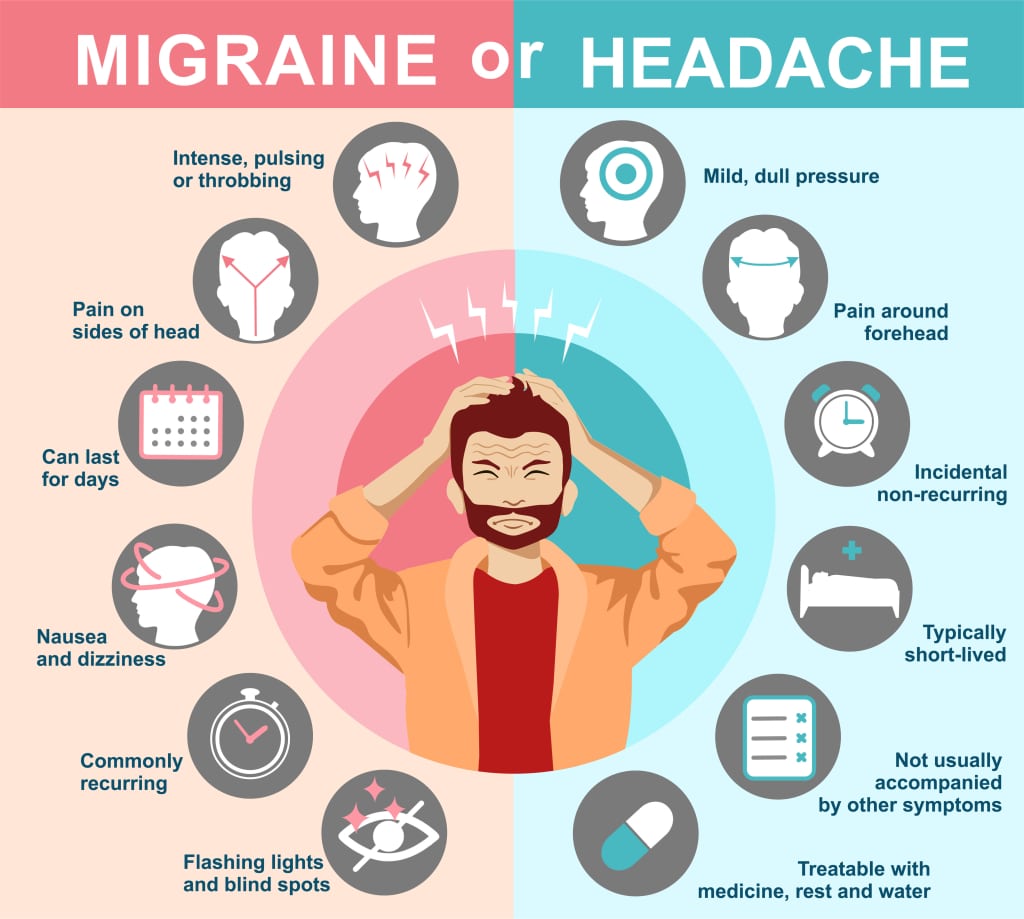What is a Migraine?
A migraine is a neurological condition characterized by an intense throbbing on one side of the head that worsens with activity. Unlike a regular headache (which can generally be relieved by Over-The-Counter meds), migraines are much more severe and often accompanied by additional symptoms such as nausea/vomiting, visual disturbances, photophobia (light sensitivity), phonophobia (sound sensitivity), cognitive dysfunction, difficulty concentrating, and fatigue. It’s important to know how to distinguish between a migraine and a common headache. There are some cases where migraines could become so intense that it requires emergency care. Surepoint Emergency Center provides reliable and fast treatment for migraine-related emergencies.
Understanding Migraines
As a neurological condition, migraines are associated with structural and functional changes in the brain, leading to the symptoms mentioned above. Several factors can trigger migraines, such as:
- Genetic Factors: Migraines could be hereditary.
- Stress: Physical or emotional stress can contribute to migraines.
- Sleep: A lack of sleep can exhaust the brain, triggering migraines.
- Environmental: Sudden weather changes, bright or flashing lights, motion sickness, or strong smells can act as triggers.
- Liquid Intake: Excessive consumption of alcohol, caffeine, energy drinks, and sodas can trigger migraines.
- Hormonal Changes: Fluctuation in estrogen levels (menstruation, menopause, and pregnancy) can trigger migraines.
Headaches are one of the most common reasons to visit the ER, with migraines being the most frequent diagnosis. In many cases, at-home treatments such as over-the-counter medication, rest, adequate hydration, and avoiding the mentioned triggers can absolve these issues. However, if your migraine becomes severe and unmanageable, come visit us at Surepoint Emergency Center for quick and personalized care-based solutions.

When a Migraine Becomes an Emergency
Migraines can be self-treatable at home, but there are times when they require immediate medical attention. Seek emergency care if you experience:
- Sudden, severe headache (often called a thunderclap headache)
- Persistent vomiting
- Dehydration
- Unusual or sporadic migraine patterns (especially if over 50)
- Confusion
- Slurred speech
- Vision disturbances
- Photophobia (extreme sensitivity to light)
- Numbness
- No relief from usual medication (if any)
If you’re experiencing any of these symptoms, don’t hesitate to visit Surepoint Emergency Center to get expert care for debilitating migraines.
Why Choose Surepoint Emergency Center?
Surepoint Emergency Center is fully equipped with resources, experience, and technology to treat intense migraines effectively. Here’s why we’re the best choice for emergency migraine care:
Immediate, Expert Care: Our team of experienced medical professionals is available 24/7.
- Little To No Wait Times: Unlike traditional ERs, we offer quicker services with shorter wait times.
- Comprehensive Treatment Options: We offer IV hydration, management of nausea and vomiting, advanced diagnostic tools (CT scans, Ultrasound, X-ray, etc.), and a full lab and pharmacy in house to ensure effective treatment.
- Personalized Care: We tailor our treatment plans to each patient while promoting a comfortable and compassionate environment.
You don’t have to suffer through unbearable migraines. We are available around the clock to provide you with the relief you need. Find the nearest Surepoint Emergency Center and get expert care–fast!
 Surepoint Emergency Center is a modern emergency medical facility open 24/7. As an alternative to the traditional hospital ER experience, we offer convenience and minimal wait time, along with highly-trained emergency medical staff and state-of-the-art equipment.
Surepoint Emergency Center is a modern emergency medical facility open 24/7. As an alternative to the traditional hospital ER experience, we offer convenience and minimal wait time, along with highly-trained emergency medical staff and state-of-the-art equipment.
Our top priority is bringing high-quality emergency care, quickly and easily to your family. We are committed to making patients feel better faster in a comforting and compassionate environment.
Expert convenient care in your neighborhood.
References
Luciani, M., Negro, A., Spuntarelli, V., Bentivegna, E., & Martelletti, P. (2020). Evaluating and managing severe headache in the emergency department. Expert Review of Neurotherapeutics, 21(3), 277–285. https://doi.org/10.1080/14737175.2021.1863148
Roland, J. (2023, April 26). Is there such a thing as a ‘Migraine brain’? Healthline. https://www.healthline.com/health/migraine/migraine-brain-vs-normal-brain
Unal-Cevik, I., & Arslan, D. (2023). Similarities and differences between migraine and other types of headaches: Migraine mimics. Neurology Perspectives, 3(2), 100122. https://doi.org/10.1016/j.neurop.2023.100122



